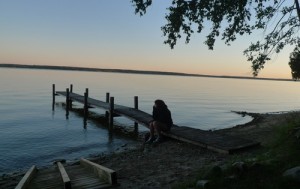No Michigan poet laureate? In the U.P., a grassroots campaign
No less an authority than the Library of Congress notes that Michigan has no poet laureate, a shortcoming we share with Massachusetts, New Jersey, New Mexico, Ohio and Pennsylvania. In national benchmarks of iambic pentameter and blank verse, we fall short. Why? How can a state that celebrates its visual poetry in Pure Michigan commercials ignore the written variety?
To be sure, Michigan supports the arts in important ways. Novelist Bonnie Jo Campbell has stated that Michigan Notable Books is her favorite award, which is a pretty significant comment coming from someone who has been a National Book Award finalist. But a poet laureate position, for me (a writer, yes), feels like a missing necessity.
Intimidated by the bureaucratic red tape of pushing for a Michigan Poet Laureate position and with the help of poet Janeen Rastall, I’ve turned my efforts to naming a first-ever Upper Peninsula Poet Laureate; five finalists were selected based on U.P. library, bookstore, and author voting, including runner-up Elinor Benedict (Rapid River), Randall R. Freisinger (Houghton), Eric Gadzinski (Sault Ste. Marie), and Austin Hummell (Marquette). Russell Thorburn (Marquette) was selected as the first U.P. Poet Laureate.
We seem to have caught a wave. Just this year, The New York Times took note of the “rapid rise in poets laureate, especially in small cities and towns. ...According to the Academy of American Poets, at least 35 larger cities have poets laureate.” So why have regional poet laureate positions become so popular?
I contacted some people who would have opinions on this matter – several of the most prestigious Midwest poets, including the five U.P. poet laureate finalists, Max Garland (current Wisconsin Poet Laureate), Patricia Clark (previous Grand Rapids Poet Laureate), and Don Hall (previous United States Poet Laureate).
Their responses were informative, passionate, varied, thorough and interesting. I don’t have room to share them all, but certain ideas that emerged and were reiterated, one that the concept of poet laureate is strongly tied to history.
Benedict wrote, “Think of the Vikings, singing around bonfires about battles with monsters. Or the Israelites, reciting tales and praise of after days in the desert. And the Greeks, speaking of the fate of proud men and beautiful women.”
For Gadzinski, “the concept of a poet laureate has ancient roots in early classical civilization.”
Garland, however, worries that that tradition may slowly be eroding, writing, “I'm sure there are people who see the poet laureate as a cuddly version of the chamber of commerce. However, as arts budgets are cut state by state, and the transfer of wealth from the working class (and education) to the economic elite is nearly complete, there is nevertheless a remnant awareness that we can't live by bread alone, particularly the crumbs trickling down from the tables of tycoons.”
Poetry, at least for poets, has a significant humanizing purpose, an absolute importance and that importance is critical in understanding the wide growth in regional poets laureate.
Clark writes that the position “celebrates the regional, in a term when regional differences might be going away toward ‘sameness’ all across the country.” And she continues that perhaps “it's an effort to put a town ‘on the map,’ in a way – get it a little attention, like trying to be a ‘cool’ city where young people want to live, and artists/writers/musicians/poets would like to live.”
Thorburn agrees that a “need for a witness to a geographic area is necessary for a culture to thrive or survive.”
For Hummell, the laureate “is more a democratic spreader of poetry as a craft, as an art form, as well as the role poetry plays and can play culturally – as protest, as intellectual awakening, as a liberator from class distinction, as an act of freedom.”
Historical ties, regional celebration, freedom itself—poetry in the hands of poets has a feeling like it’s at the heart of a country’s (or region’s) concerns.
Hopefully Michigan will follow in the footsteps of Arizona’s state legislature, which created their poet laureate position in 2012. Whoever has the dedication to be at the forefront of creating that Michigan Poet Laureate position is a hero in my book.
See what new members are saying about why they donated to Bridge Michigan:
- “In order for this information to be accurate and unbiased it must be underwritten by its readers, not by special interests.” - Larry S.
- “Not many other media sources report on the topics Bridge does.” - Susan B.
- “Your journalism is outstanding and rare these days.” - Mark S.
If you want to ensure the future of nonpartisan, nonprofit Michigan journalism, please become a member today. You, too, will be asked why you donated and maybe we'll feature your quote next time!


 TOO BEAUTIFUL FOR WORDS?: How can a region "by the shores of Gitche Gumee" not have a poet laureate? (Bridge photo by Nancy Derringer)
TOO BEAUTIFUL FOR WORDS?: How can a region "by the shores of Gitche Gumee" not have a poet laureate? (Bridge photo by Nancy Derringer)